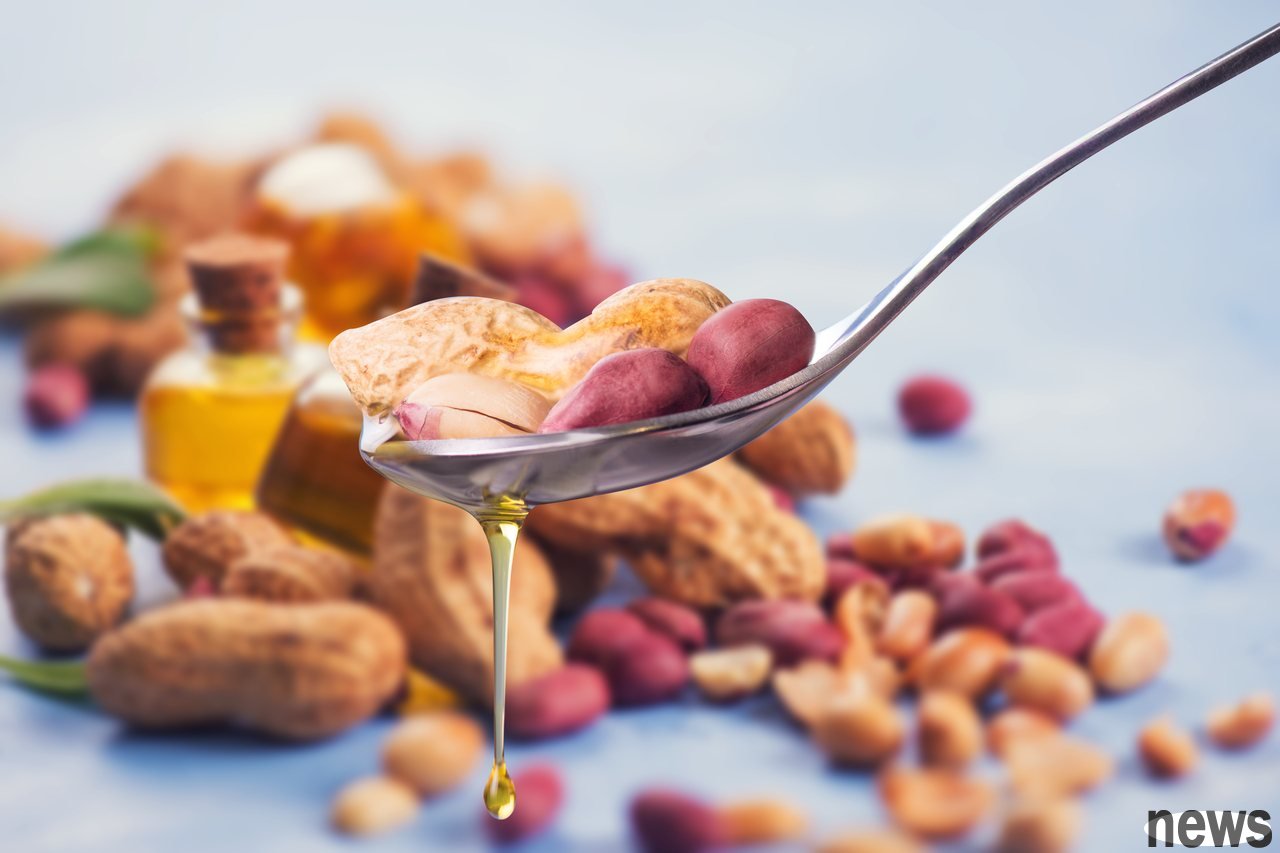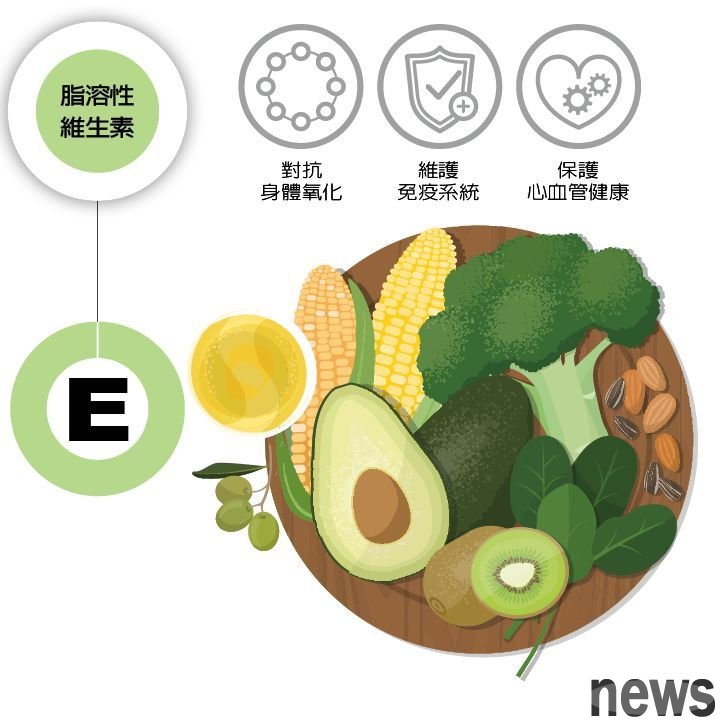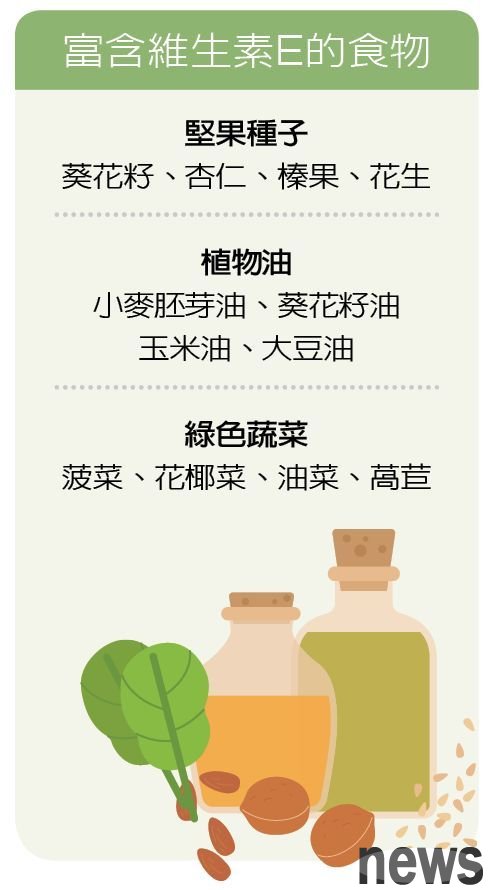What are the effects of vitamin E? How to eat it? What are the side effects of overdose extraction? What drugs should be avoided?

What is vitamin E? In fact, vitamin E is composed of eight elements, including antioxidant tocool (α, β, γ, δ-tocopherols) and tocopherol (α, β, γ, δ-tocotrienol). Among them, the main physiological effect in the body is α-tocopherol, a light yellow oil substance, soluble in oil solvents, and can be seen to stabilize light, but it is easily damaged by ultraviolet or high temperature and is easily oxidized.
What are the importance of vitamin E?. Antioxidant
. Prevent platelet coagulation and cause blood vessel expansion
. Protect vascular endothelial cells

Huang Linhui, a nutritionist at Hsinchu Affiliated Medical University of Chinese Medicine, pointed out that vitamin E has the effects of antioxidant, preventing platelet coagulation, vascular expansion, and protecting vascular endothelial cells for the human body, and is also positively helpful for cardiovascular diseases, cancer, cataracts, Alzheimer's disease, etc.
{9. Hemolytic blood
. Muscle weakness
. Vision problem
. Immune system changes
Huang Linhui said that if the body lacks vitamin E, it may cause hemolytic blood, muscle weakness, vision problems, immune system changes, numbness, difficulty walking, tremor and poor balance. However, people with balanced diets on weekdays are less likely to lack vitamin E unless they have not taken oils or fruits for a long time, or suffer from rare and rare diseases, and those with fat malabsorption.
What are the food sources of vitamin E?. Fruit seeds
. Vegetable oil
. Green vegetables
vitamin E are actually widely present in various foods and fats, such as fruit seeds (sunflower seeds, almonds, hazelnuts, peanuts), vegetable oils (meat germ oil, sunflower seed oil, corn oil, soybean oil), and green vegetables (spinach, cauliflower). Under a balanced diet, vitamin E is not required to supplement with additional high doses. As long as you take appropriate amounts of fruits, healthy oils and green vegetables every day, vitamin E can be obtained.
Who needs vitamin E supplement?. Most people do not need to supplement with a single prescription, and it is recommended to take general comprehensive vitamins.

Huang Linhui emphasized that the amount of single vitamin E supplements sold on the market is mostly higher than the recommended intake. Most people do not need to supplement them specifically. Just get enough vitamin E from their diet, otherwise there will be excessive anxiety. For unbalanced diets or external food groups, it is recommended to use general comprehensive vitamins to supplement vitamin E that is lacking in diet.
In addition, when people choose commercially available vitamin E supplement products, they do not necessarily mark each mg unit (mg), but mark the international unit IU, whose calculation conversion method is α-TE (alpha-Tocopherol Equivalent) 1mg is approximately equal to 1.49IU. dl-alpha1 mg is equal to 1.1 IU. When choosing, people should pay attention to the label on the packaging, and then purchase it after confirming the appropriate dosage.
What are the side effects of excessive vitamin E?. Increase risk of bleeding brain wind
. Overdose of vitamin E intake may cause side effects, such as abdominal pain, headache, and nausea. Liu Xun, a pharmacist at the Hsinchu Branch of Taoyuan General Hospital of the State Army, pointed out that clinical trials found that if excessive doses of vitamin E supplements are taken, it may increase the risk of bleeding brain wind, or cause abdominal pain, headache, nausea, blurred vision, rash, etc.
联究空空空空空空空空空空空空空空空空空空空空空空空空空空空空空空空空空空空空空空空空空空空空空空空空空空空空空空空空空空空空空空空空空空空空空空空空空空空空空空空空空空空空空空空空空空空空空空空空空空空空空空空空空空空空空空空空空空空空空空空空空空空空空空空空空空空空空空空空空空空空空空空空空空空空空空空空空空空空空空空空空空空空空空So basically as long as the liver function is healthy and normal, vitamin E will not be overdose unless the intake amount exceeds the liver load.
Liu Ji all suggested that people can understand the recommended intake and upper limit dose for each age based on the national dietary nutritional reference intake volume provided by the Ministry of Health and Welfare. For example, the recommended intake volume for adults over 19 years old is 12 mg per day and the upper limit is 1,000 mg.
What drugs should be avoided with vitamin E?. It is recommended that the doctor evaluate and then supplement
. The combination of anticoagulant drugs to increase bleeding risks
Liu Ji reminds that if you need to use high dose supplements, it is best to use them after evaluation by the doctor, especially patients with hemorrhagic diseases, diabetes, or vascular disease, and vitamin K deficiency. Because taking drugs in daily life may cause drug interactions when taking vitamin E, causing other health risks.
For example, taking vitamin E and anticoagulant drugs at the same time may increase bleeding risks; taking vitamin E and K at the same time will cause a decrease in the effect of vitamin K.
Responsible editor: Gu Zihuan




